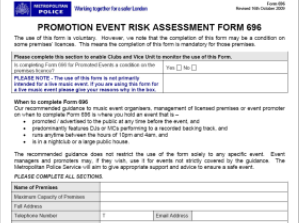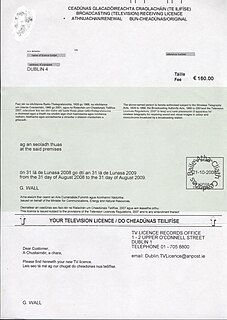 W
WDouglas v. U.S. Dist. Court ex rel Talk America, 495 F.3d 1062 (2007), is a U.S. Circuit Court of Appeals case that examines whether a service provider may change the terms of its service contract by merely posting a revised contract on its website, without informing the other party of the changes.
 W
WForm 696 is a risk assessment form which the London Metropolitan Police requests promoters and licensees of events to complete and submit 14 days in advance of an event in 21 London boroughs. Non-compliance with this may result in police opposition to event licences being granted. This form has become controversial due to its stipulation that names, stage names, private addresses, and phone numbers of all promoters, DJs and artists be listed. The form also asks for a description of the style of music to be performed and the target audience. The original form asked for details of ethnic groups likely to attend the performance, but that version was revised to omit those parameters in December 2008. In November 2017, the Met Police announced that following a review of how the form was being used it was to be scrapped.
 W
WHarris v. Blockbuster, Inc., 622 F. Supp. 2d 396, established precedent in the district that when a contract has a clause that authorizes one party to make changes to the "contract" without notification, that it is illusory and hence the entire "contract" is void.
 W
WOlli is a Dutch children's book character and a stuffed toy. The character Olli was original created in 2004 by Dutch designer and film director Hein Mevissen and writer Diederiekje Bok as a character for a bottled mineral water. Olli was one of many characters used on the packages and posters of the bottled water brand and John's Phone. Olli was launched at a party of MTV In Rotterdam in 2004. In 2013 Olli was again part of a campaign. This time to save the Rotterdam Zoo Diergaarde Blijdorp. Olli is part of the Ollimania family which is the company that created and owns all characters. Olli became a national hype in the Netherlands from the launch in 2004. After the launch Olli became the symbol of Rotterdam and professional football club Feyenoord. On 10 September 2015, Ollimania and its creators Hein Mevissen and Diederiekje Bok donated a huge Olli statue to the Sophia Children's hospital in Rotterdam.
 W
WThe Open Database License (ODbL) is a copyleft license agreement intended to allow users to freely share, modify, and use a database while maintaining this same freedom for others.
 W
WThe Licence Ouverte / Open Licence is a French free licence published on October 18, 2012 by Etalab on October for open data from the State of France. The license was designed to be compatible with Creative Commons Licenses, Open Government License, and the Open Data Commons Attribution License. Information released under the Open License may be re-used with attribution, such as a URL or other identification of the producer. The Open License is used by the city of Bordeaux, France to release data sets.
 W
WThe technology life-cycle (TLC) describes the commercial gain of a product through the expense of research and development phase, and the financial return during its "vital life". Some technologies, such as steel, paper or cement manufacturing, have a long lifespan while in other cases, such as electronic or pharmaceutical products, the lifespan may be quite short.
 W
WIn Ireland, a television licence is required for any address at which there is a television set. Since 2016, the annual licence fee is €160. Revenue is collected by An Post, the Irish postal service. The bulk of the fee is used to fund Raidió Teilifís Éireann (RTÉ), the state broadcaster. The licence must be paid for any premises that has any equipment that can potentially decode TV signals, even those that are not RTÉ's. The licence is free to anyone over the age of 70, some over 66, some Social Welfare recipients, and the blind. The fee for the licences of such beneficiaries is paid for by the state. The current governing legislation is the Broadcasting Act 2009, in particular Part 9 "Television Licence" and Chapter 5 "Allocation of Public Funding to RTÉ and TG4". Devices which stream television via internet do not need licences, nor do small portable devices such as mobile phones.
 W
WIn the British Islands, any household watching or recording television transmissions at the same time they are being broadcast is required by law to hold a television licence. This applies regardless of transmission method, including terrestrial, satellite, cable, or for BBC iPlayer internet streaming. The television licence is the instrument used to raise revenue to fund the BBC; it is a form of taxation.
 W
WTV detector vans are vans, which, according to the BBC, contain equipment that can detect the presence of television sets in use. The vans are operated by contractors working for the BBC, to enforce the television licensing system in the UK, the Channel Islands and on the Isle of Man.